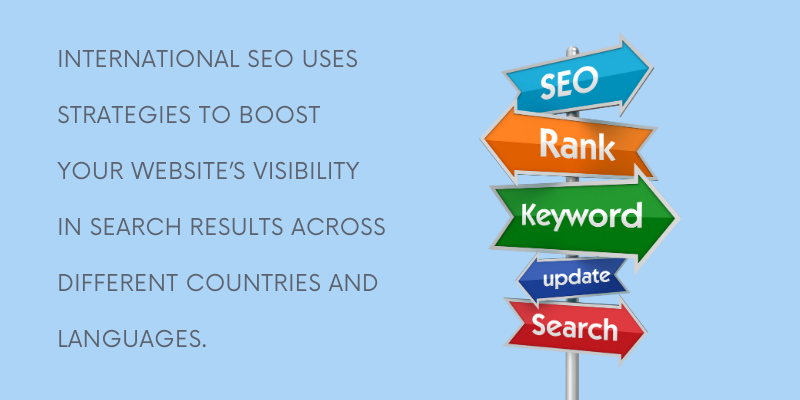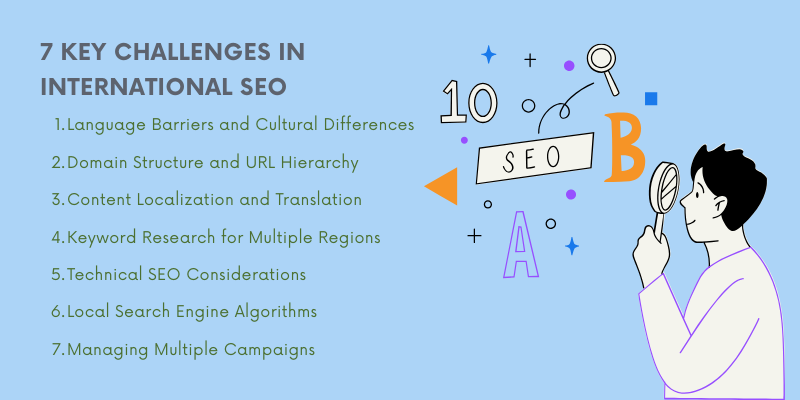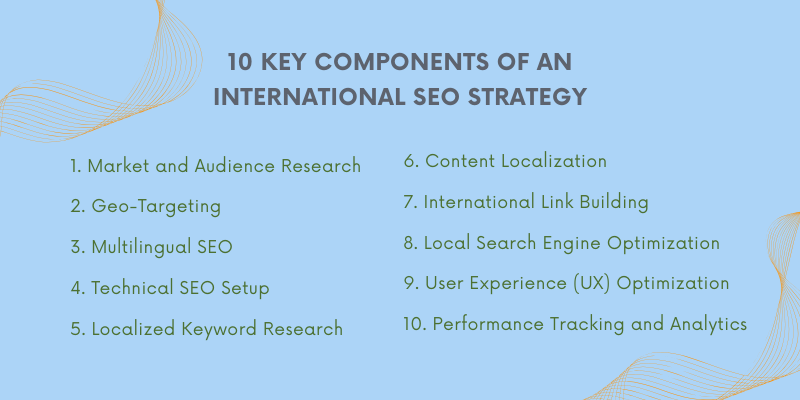If you want to take your business global, you need more than just a website, you need a well-planned international SEO strategy.
So, why is an international SEO strategy important for growth?
In today’s digital age, customers can come from anywhere in the world, but reaching them requires more than simply translating your content.
An international SEO strategy helps your business connect with audiences in different countries by optimizing your site for local search engines, languages, and cultural expectations.
For example, understanding what are five marketing strategies that retailers spend half of their annual budget on can provide valuable insights into the effectiveness of your global approach.
It’s about understanding how people in various regions search online, the keywords they use, and the kind of experience they expect.
When you tailor your website’s content, structure, and technical SEO to specific markets, you improve visibility in local search results and attract the right audience.
This not only increases traffic but also builds brand awareness globally, making international SEO a powerful driver for long-term business growth.
What is International SEO?
International SEO refers to the practice of optimizing your website and content to rank well in search engine results across different countries, regions, and languages.

Unlike traditional SEO, which focuses on targeting a single audience or location, international SEO ensures that your website reaches global audiences by considering various language preferences, cultural nuances, and regional search behaviors.
It involves tailoring your website's structure, content, and technical aspects to make it visible and relevant to international users.
Understanding what is the digital marketing strategy that tracks users across the web can help you align with the latest trends and optimize global reach.
Why an SEO Strategy is Important for Growth?
An SEO strategy is vital for sustainable business growth because it improves your website’s visibility in search engines, helping potential customers find you when they need your products or services.
Unlike paid ads, SEO delivers long-term, cost-effective traffic.
It builds trust and credibility, as users often see higher-ranking websites as more reliable. SEO also provides valuable insights into customer behavior, helping you refine marketing efforts and create content that resonates with your audience.
For businesses looking to expand globally, international SEO allows you to target multiple regions and languages, boosting your global reach.
One of the best tools to achieve this is using SEO ranking report software, which helps track your performance across different regions.
In short, a strong SEO strategy drives visibility, trust, and growth, making it a key factor for long-term success.
Difference Between International and Local SEO
Here’s a clear table showing the difference between International SEO and Local SEO:
|
Aspect |
Local SEO |
International SEO |
|
Target Audience |
Focuses on a specific city, state, or region. |
Targets audiences across multiple countries and regions. |
|
Goal |
Increase visibility within a local area to attract nearby customers. |
Expand reach globally to capture international traffic and customers. |
|
Keywords |
Uses location-based keywords (e.g., "bakery in New York"). |
Uses multilingual and region-specific keywords for various countries. |
|
Search Engines |
Primarily optimized for Google or local search engines in one region. |
Optimized for multiple search engines like Google, Baidu, Yandex, or Naver. |
|
Content Strategy |
Content tailored to local culture, events, and community interests. |
Content localized and translated to fit different languages and cultural contexts. |
|
Technical Setup |
May use simple site structure with local business schema and Google My Business. |
Requires hreflang tags, country-specific domains, and complex site architecture. |
|
Scope |
Narrow, focusing only on local markets. |
Broad, targeting multiple countries and global markets. |
|
Examples of Tactics |
Local listings, customer reviews, and Google Maps optimization. |
Country-specific URLs, language localization, and global link-building strategies. |
7 Key Challenges in International SEO
Implementing a successful international SEO strategy comes with several hurdles that businesses must address when expanding globally:

- Language Barriers and Cultural Differences: Crafting content that resonates with diverse audiences while respecting local customs and preferences.
- Domain Structure and URL Hierarchy: Choosing between ccTLDs, subdomains, or subdirectories to target different countries effectively.
- Content Localization and Translation: Going beyond direct translation to create culturally relevant, engaging content for each market.
- Keyword Research for Multiple Regions: Identifying region-specific search terms and adapting to varying user behavior across countries.
- Technical SEO Considerations: Ensuring fast site speed, mobile-friendliness, and proper indexing for international audiences.
- Local Search Engine Algorithms: Optimizing for different search engines like Google, Baidu, Yandex, or Naver, each with unique ranking factors.
- Managing Multiple Campaigns: Coordinating and tracking various country-specific strategies and performance metrics. Tracking can be simplified with best SEO audit tool.
While these challenges can seem daunting, the right strategy, tools, and expertise can help you overcome them and fully unlock the benefits of international SEO.
10 Key Components of an International SEO Strategy
Here are the ten key components of an International SEO strategy:

1. Market and Audience Research
Before expanding globally, it’s essential to understand which markets have the most potential for your business.
This involves researching your target countries, analyzing their search behavior, and identifying the demographics you want to reach. It also means studying local competitors to see what strategies they use to rank higher.
By knowing the needs, habits, and challenges of your international audience, you can create an SEO plan that truly connects with them.
Additionally, SEO audit pricing can vary depending on the complexity of your strategy, so it’s important to plan your budget accordingly.
2. Geo-Targeting
Geo-targeting helps search engines understand which version of your website should appear to users in different countries.
This can be done using country-specific domains (ccTLDs), subdomains, or subdirectories. Implementing hreflang tags is also crucial as it signals the correct language and region for each page.
Proper geo-targeting ensures that visitors are served the right content, improving both their experience and your search visibility.
3. Multilingual SEO
Simply translating content is not enough when targeting international markets. Multilingual SEO focuses on creating region-specific content that resonates with local users.
This includes proper keyword research in each language, culturally appropriate messaging, and avoiding direct translations that may lose meaning.
4. Technical SEO Setup
A strong technical foundation is vital for global SEO success. Your website must be optimized for site speed, mobile-friendliness, and indexing across different regions.
Ensure that your URL structure is clear and properly configured for international audiences.
Explore Our Programmatic SEO Services
5. Localized Keyword Research
Search habits vary by region, even for the same product or service. Localized keyword research helps you identify the terms and phrases that people in a specific country actually use.
For instance, the same item may have entirely different names in the U.S., U.K., or Australia.
6. Content Localization
Localization goes beyond translation. It involves adapting your content to match cultural preferences, local trends, and even seasonal differences.
For example, marketing campaigns for holidays will vary depending on the country.
7. International Link Building
High-quality backlinks remain a core ranking factor in SEO. When targeting multiple countries, focus on building links from local, authoritative websites.
Collaborate with local bloggers, influencers, and industry publications to earn backlinks that strengthen your presence in specific markets.
8. Local Search Engine Optimization
While Google dominates in many countries, other search engines like Baidu (China), Yandex (Russia), and Naver (South Korea) have strong local user bases.
Optimizing your site for these platforms requires understanding their unique algorithms and rules.
Explore Our Local SEO Services
9. User Experience (UX) Optimization
A seamless user experience is key to converting international visitors into customers. This means using clear navigation, localized calls-to-action (CTAs), and intuitive design that matches local preferences.
Additionally, consider currency, payment methods, and even design colors that resonate with specific cultures.
10. Performance Tracking and Analytics
No strategy is complete without proper tracking. Use analytics tools like Google Analytics and Search Console to monitor how your international pages are performing.
Keep an eye on key metrics like rankings, traffic, and conversions in each target country. Tracking performance with best SEO reporting software can provide insights into which international markets are performing best.
By focusing on these components, your international SEO strategy will not only increase visibility but also create a strong global presence that drives sustainable growth.
5 International SEO Best Practices
Here are some of the key best practices for optimizing your international SEO strategy:
- Use Hreflang Tags Correctly: Help search engines display the right language and regional version of your website to the correct audience.
- Choose the Right Domain Structure: Decide between ccTLDs, subdomains, or subdirectories for targeting different countries effectively.
- Localize Content, Don’t Just Translate: Adapt content to match cultural context, local slang, and preferences for better engagement.
- Optimize for Local Search Engines: Consider search engines like Baidu, Yandex, or Naver, in addition to Google, based on the target region.
- Monitor and Track Performance by Region: Use analytics tools to track rankings, traffic, and conversions separately for each country. Also, using enterprise SEO services can scale your optimization efforts across larger markets.
FAQs: Why Is An International SEO Strategy Important for Growth?
Can I Use the Same SEO Strategy for All Countries?
No, a one-size-fits-all strategy won’t work for international SEO. Each country has its own search landscape, cultural nuances, and user behavior. Your SEO strategy must be customized for each target market, including local keywords, search engines, and content tailored to the audience’s preferences.
How Do I Choose the Right Keywords for International SEO?
Start by conducting keyword research for each country using tools like Google Keyword Planner, Ahrefs, or SEMrush. Focus on keywords with high search volume and strong relevance to your business. Be sure to adapt keywords to local languages, dialects, and search habits to capture the right audience.
How Can I Optimize My Website for Multiple Languages?
Use a multilingual Content Management System (CMS) or a Content Delivery Network (CDN) to manage different language versions of your site. Implement hreflang tags to tell search engines which version of a page should appear for specific regions and languages, ensuring proper indexing and visibility.
Conclusion
Now that we've covered all aspects of why is an international SEO strategy important for growth, it's time to move toward the concluding remarks.
An effective international SEO strategy offers numerous benefits for businesses aiming to expand their global reach.
By optimizing content for different languages, cultures, and regions, businesses can improve their search engine rankings, drive more relevant traffic, and establish a strong presence in international markets.
Key benefits include enhanced visibility, stronger brand recognition, and better customer engagement across diverse audiences.
An international SEO strategy is crucial in driving global growth and ensuring long-term success. As businesses expand into new markets, international SEO services enables them to connect with local customers, build trust, and gain a competitive edge.
By targeting the right keywords, optimizing technical elements, and providing localized content, businesses can improve their rankings and performance across multiple regions.
To implement an effective international SEO strategy for your business, focus on understanding local search behaviors, using proper geo-targeting, and continuously refining your approach.
By adapting to each market's unique requirements and staying ahead of SEO trends, businesses can ensure they remain competitive, foster international growth, and achieve sustained success in the global digital landscape.









